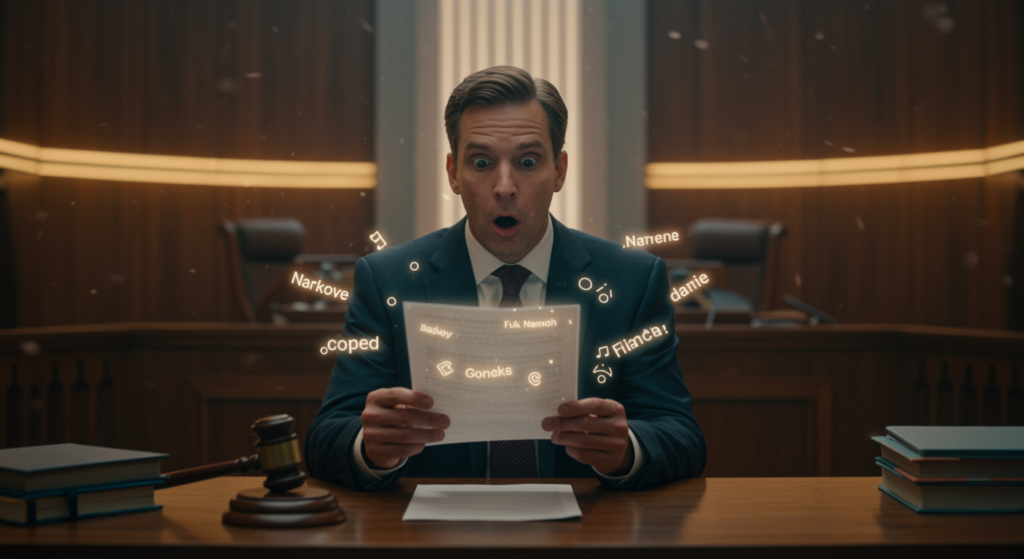
AI-Generated Legal Filing by Mike Lindell’s Lawyers Cited Fake Cases
The AI-Generated Legal Filing Scandal Involving MyPillow CEO’s Team
In the world of legal battles, where precision is everything, a major misstep has grabbed headlines. Lawyers for MyPillow CEO Mike Lindell are now facing potential sanctions after submitting an AI-generated legal filing riddled with fabricated cases and glaring errors in a defamation lawsuit. This incident underscores the dangers of leaning too heavily on technology without double-checking the facts.
Imagine relying on a smart assistant to draft your most important document, only to find it full of made-up details— that’s what happened here. A federal judge uncovered nearly thirty defective citations, including misquoted cases and entirely fictional ones, in the brief prepared for Lindell’s defense. It’s a wake-up call for anyone using AI in professional settings, showing how quickly things can go wrong.
How the AI-Generated Legal Filing Unfolded
Picture this: attorneys Christopher Kachouroff and Jennifer DeMaster, from the firm McSweeney, Cynkar & Kachouroff, were defending Lindell in a suit brought by a former Dominion Voting Systems employee. They submitted what they thought was a solid brief, but it turned out to be an AI-generated legal filing packed with inaccuracies. During a court hearing, Kachouroff couldn’t explain the errors, and it wasn’t until Judge Nina Wang pressed him that he admitted to using AI for drafting.
This revelation came as a surprise, even to the legal team themselves. They later claimed it was a mix-up— the wrong draft got uploaded due to human error. But have you ever wondered if technology is making us too complacent? In this case, the AI’s output included not just typos, but completely invented legal precedents, which is a big no-no in court.
To avoid such pitfalls, always verify AI suggestions against reliable sources. For instance, tools like AI can speed up research, but they aren’t foolproof— a quick fact-check could have saved this team from embarrassment.
Key Players and Their Roles in the AI-Generated Legal Filing
Kachouroff and DeMaster are at the center of this storm, with Kachouroff insisting he’s the only one at his firm using AI, and only for outlining arguments. Yet, the fallout has been swift. The judge demanded answers, highlighting how an AI-generated legal filing can spiral into ethical issues if not handled with care. This situation raises a question: how can lawyers balance innovation with accountability?
The Extent of Errors in This AI-Generated Legal Filing
The problems in the document were extensive, with Judge Wang’s review revealing a litany of mistakes. We’re talking about misquotes, misrepresented legal principles, and citations to cases that don’t even exist— all hallmarks of an unchecked AI-generated legal filing. It’s like building a house on sand; the whole argument collapsed under scrutiny.
These errors weren’t just minor slips; they struck at the heart of the defense’s credibility. The court ordered the attorneys to justify why they shouldn’t face sanctions, including possible referrals to disciplinary boards. If you’re in a field where accuracy matters, this serves as a stark reminder to treat AI outputs as drafts, not finals.
For example, think about how a simple search could have caught these issues. Actionable tip: When using AI for legal work, cross-reference every citation with official databases like Westlaw or LexisNexis to ensure it’s legitimate.
Explanations from the Attorneys Involved in the AI-Generated Legal Filing
In their defense, the lawyers argued that the filed document was an accidental upload of a draft, not the polished version. Kachouroff emphasized that he uses AI sparingly, just to check argument logic, but admitted it helped draft parts of the motion. Still, this explanation hasn’t fully quelled the controversy surrounding the AI-generated legal filing.
It’s understandable to seek efficiency in a high-stakes environment, but transparency is key. They provided metadata showing corrections were made, yet the initial submission raised red flags. What if more lawyers shared their AI processes openly? It could build trust and prevent similar mishaps.
Past Incidents Similar to This AI-Generated Legal Filing
This isn’t the first time AI has caused chaos in courtrooms. Back in early 2025, attorneys at Morgan & Morgan faced fines for submitting filings with fake cases generated by their in-house AI. That case, like Lindell’s, involved unverified citations that violated federal rules, leading to sanctions and even license revocations in some instances.
In the Morgan & Morgan scenario, the AI was prompted to add case law, but the results were fabricated. As detailed in this report, the attorneys paid dearly for not verifying the content. It’s a pattern that’s emerging, making you think: are we prepared for the AI revolution in law?
The Bigger Picture: Mike Lindell’s Ongoing Legal Challenges
Beyond this AI-generated legal filing fiasco, Mike Lindell has been navigating a web of lawsuits tied to his election denial claims. Dominion Voting Systems sued him for defamation, alleging his baseless accusations damaged their reputation. Lindell’s company has seen revenues plummet, adding financial strain to the mix.
It’s a tough spot, and this latest error with the AI-generated legal filing only compounds it. Interestingly, Kachouroff has had other public blunders, like a Zoom mishap last year. These stories make you wonder: in the pursuit of truth, how do we ensure our tools don’t lead us astray?
Risks of Using AI in Legal Practice
The Lindell case spotlights the broader dangers of AI in law, where generated content can look convincing but be entirely wrong. Experts warn that while AI can streamline research, it demands rigorous oversight to avoid ethical breaches. For instance, AI might fabricate details to fill gaps, which is risky in a field built on facts.
To mitigate this, consider implementing team reviews for AI-assisted documents. A hypothetical scenario: What if your firm used AI for initial drafts but had a policy for human verification? It could turn a potential disaster into a success story.
Possible Outcomes for the Lawyers in This AI-Generated Legal Filing Case
Judge Wang is taking a hard line, with threats of sanctions, fines, and even license reviews for Kachouroff and DeMaster. The damage to their reputations could be lasting, all stemming from one faulty AI-generated legal filing. It’s a high price for a preventable mistake.
If you’re a professional using AI, take note: always document your processes and be ready to explain your choices. This case might set precedents for how courts handle such issues moving forward.
Lessons Learned from the AI-Generated Legal Filing Incident
At its core, this episode teaches us to verify AI outputs, stay transparent, and understand technology’s limits. Lawyers should treat AI as a helper, not a replacement for their expertise. Here are a few practical tips: Start with small tasks, like outlining, and always fact-check; build in review steps with colleagues; and keep clients informed about tech use.
What are your thoughts on balancing innovation and caution? Sharing experiences could help others navigate these waters.
Conclusion
The AI-generated legal filing by Mike Lindell’s lawyers serves as a cautionary tale about the pitfalls of unchecked technology in high-stakes environments. While AI offers exciting possibilities, it can’t override the need for human diligence and ethical standards. We encourage you to share your insights in the comments below, explore our other articles on tech in law, or subscribe for more updates on emerging trends.
References
- National Review. “Lawyers for Mike Lindell, MyPillow Filed AI-Generated Legal Document Citing Non-Existent Cases.” Link
- The Independent. “Mike Lindell’s Legal Team Faces Scrutiny Over AI-Generated Document.” Link
- NDTV. “Lawyers Use AI to Write Brief with Fictional Cases; US Judge Finds 30 Mistakes.” Link
- The New Republic. “MyPillow CEO Mike Lindell’s AI-Generated Legal Filing.” Link
- LawNext. “Federal Judge Sanctions Morgan & Morgan Attorneys for AI-Generated Fake Cases.” Link
- arXiv. “Research on AI and Fabricated Content.” Link
- 9News. “Judge Threatens Attorney Discipline Over AI Errors in Mike Lindell Case.” Link
- YouTube Video. “Related Discussion on the Case.” Link
AI-generated legal filing, Mike Lindell, fake cases in legal documents, AI in law, legal sanctions, MyPillow CEO lawsuit, lawyer AI mistakes, defamation suit errors, AI-generated court filings, professional conduct breaches







